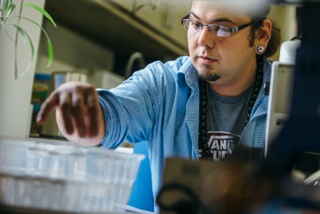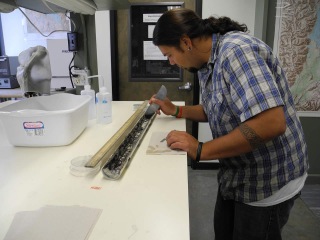Former Salish Kootenai College student Matthew Weingart receives prestigious NSF Graduate Research Fellowship for work in paleoecology
By Ryan Winn
The Flathead Indian Reservation of western Montana has been occupied by Native peoples for millennia. Over the years, its wooden mountains and fertile valleys have both shaped and been shaped by this human presence.
For Matthew Weingart, a member of the Klamath Tribe, this relationship between people and the land represents a research opportunity. Fascinated by the impact of climate, fire, and humans on landscapes over time, Weingart is digging into the soil of the reservation’s Camas Prairie where, he said, “there’s a rich cultural history and human presence” dating back at least 13,000 years.
“It is in a type of forest that is typically not well understood,” he said. “Learning more about these systems can provide useful knowledge to forest and land managers, especially in times of changing environmental conditions.”
Now pursing a master’s degree in environmental science from Montana State University, Weingart’s work in the field of paleoecology has earned him a National Science Foundation Graduate Research Fellowship Program (GRFP) award. The prestigious award is the oldest graduate fellowship of its kind and, according to the NSF, “has a long history of selecting recipients who achieve high levels of success in their future academic and professional careers.” Previous recipients include “numerous Nobel Prize winners, U.S. Secretary of Energy Steven Chu, Google founder Sergey Brin, and Freakonomics co-author Steven Levitt.”
~~~~~
WEINGART WAS ALREADY a tribal college success story when he entered MSU. He earned his associate of science degree in mathematical sciences and dual bachelor of science degrees in forestry and hydrology from Salish Kootenai College in Pablo, Montana.
“I believe the lessons I learned from SKC hold real-world value and the knowledge gained was immediately applicable,” Weingart said. “Those skills can be applied to any form of research, either academically or in a management scenario.”
Weingart’s alma mater is equally proud of his accomplishments. SKC Hydrology Department Instructor Shandin Pete described him as having “a true and passionate inquisitiveness about the natural world.”
“As an undergraduate, Matt was very quick to learn new techniques and analytical methods,” Pete said. “He exhibited exceptional leadership in the classroom and reliability in his field activities. Often, he would complete field data analysis and enquire about additional analysis he could perform.”
Pete predicted continued success for Weingart’s future. “Matt is also remarkably humble, a good listener, thoughtful, and open to new perspectives and ideas. These attributes and his other undergraduate merits were reminiscent of the qualities of a true revolutionary in the science field,” he said.
“On a personal level, Matt has lived a life that has allowed him to experience many of life’s challenges and opportunities,” Pete said. “He has not been sheltered from the harsh realities of life, nor has he allowed these realities to define his boundaries of educational aspirations. He is a survivor and a thinker.”
To help him walk his educational journey, Weingart credits his mother, calling her “a great supporter throughout my undergraduate studies.” He continued, “I think my advisors and the mentors I met while on internships were my greatest support system.”
Like many Native scholars, Weingart believes more of America’s first citizens should pursue STEM fields. “Native students have a unique perspective of the world and can use that perspective to enhance the view of western science,” he said. His advice to emerging Indigenous scholars is, “Even if it seems difficult, never give up. If it is your dream to be a researcher or professional in the STEM fields, don’t let anything stop you.”
This is advice that Weingart personally hopes to instill in others after completing his education. “I would like to work for some natural resources program for a while if possible,” he said, “and then become a professor of the natural sciences at an institution that supports minorities and underrepresented students in the STEM fields. Life is not always easy, and my life experiences would allow me to encourage them that they can be successful too.”
~~~~~
FOR NOW, THOUGH, WEINGART is happy to have been chosen as an NSF Graduate Fellow and speaks graciously about the honor.
“Having the NSF GRFP award will allow me to expand my research methodology by incorporating more techniques that would have not been possible without it. It will also provide support that will allow me to focus on my coursework and research without having to worry about generating income.” For Weingart, that means less time away from his studies and more time behind a microscope.
Matthew Weingart is an NSF Graduate Research Fellow to be admired. He’s a student grounded in the present, analyzing the past, and creating a pathway towards the future.
Author Biography:
Ryan Winn teaches English, theatre, and communication at College of Menominee Nation, a tribal college which has campuses in both Keshena and Green Bay, Wisconsin. He is the director of creativity and inclusion for CMN’s STEM HERO Program, where his role is to guide students’ application of creative communication strategies.


